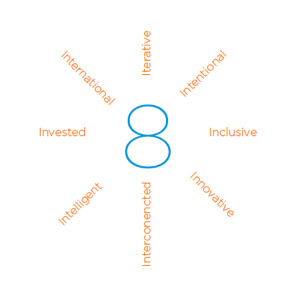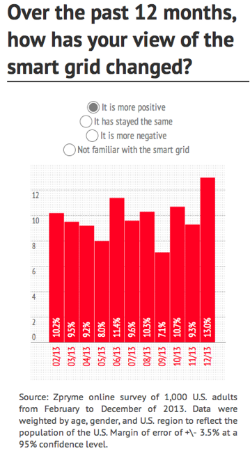This is the final blog post in a series of three blog posts proposing that the Smart Grid is a possible contributing remedy to fighting global climate change. This post addresses potential obstacles and developments of the Smart Grid within the United States, the European Union, and China and touches on international collaborations amongst those three countries. The first blog in this series provided context about global climate change in general and detailed what the Smart Grid is. The second blog in this series analyzed the Smart Grid on a more country-specific level and discussed how the United States, the European Union, and China define and value the Smart Grid.
Part III: International Obstacles and Developments
Smart Grids are gaining global traction.[1] This provides room for collaboration and capitalization on country strengths.[2] U.S. Deputy Energy Secretary Daniel B. Poneman has stated that top greenhouse gas emitters like the United States (“U.S.”) and China have a common duty to remedy climate change and secure alternative energy sources.[3]
Generally, national legal frameworks like the Energy Independence and Security Act of 2007, federal stimulus money, and utility-driven initiatives “to add value and increase system efficiencies” have supported U.S. Smart Grid developments whereas Smart Grid deployment in the European Union (“E.U.”) significantly depends upon “policy mandates to meet environmental and climate goals” and China’s Smart Grid development has hinged upon significant state funding from the State Grid Corporation of China. Nonetheless, Smart Grids are progressing despite being a part of the notoriously slow-changing electrical industry.

These three countries have strengths that have the potential to benefit the global development and adoption of Smart Grids. For an audio account of U.S. strides in the Smart Grid from the 2013 U.S. Smart Grid Year in Review webinar held on December 5, 2013, click here. China’s smart meters are anticipated to be half the price of those in the U.S. and E.U. This price difference is largely “attributable to cheaper labor and installation costs, shorter meter life span, no import taxes and lower transportation costs, and use of power line communications, which require few changes to existing transmission infrastructure.” The E.U.’s deregulated market suggests more grid automation than in the U.S., which may promote more rapid smart meter deployment.
The U.S., the E.U., and China also face similar obstacles with respect to Smart Grids, which make collaboration with each other, and the greater international community, beneficial to further domestic and global climate change progress. Because most of the Smart Grid’s key components already exist, “better communication, coordination, and incentives for consumers, power suppliers, and government agencies” are more important than expending resources to make the technologies more advanced. Problems include increased electricity bills, implementation cost recovery, and job loss and shortages.
Specifically, consumer expectations and education regarding energy present a universal obstacle in consumer acceptance of the Smart Grid.[4] U.S. consumers have evolved to meld the concept of luxury with “profligate waste.”[5] Similarly, China, as a developing country, may be more concerned with economic growth, and the increased consumerism and pollution that result from urbanization, than being environmentally sound. As a developing country, the focus tends to be on economic growth at the expense of environmental degradation. However, some scholars hypothesize that once that country becomes more industrialized, the environment will become more valuable and protected.[6]
Generally, science has demonstrated that humans have an innate tendency to over-consume, rather than conserve, to attract mates and reproduce.[7] Perception shifts of energy from a public good to a valuable resource[8] are essential to energy efficiency being a viable solution to global climate change. Daniel Yergin advocates that conservation and energy efficiency should “become ‘part of our DNA.’” He described that Japan is a global energy efficiency leader because of its “deep-seated cultural value of ‘mottainai’, which translates as ‘too precious to waste.’” As a solution, the U.S., the E.U., and China have been addressing consumer education with respect to the Smart Grid, but some criticize the E.U. and U.S. as inadequately reaching out to consumers.

This year, it is estimated that smart meters in the United Kingdom have motivated a significant number of consumers to become more energy efficient. Also, as of December 2013 in the U.S., consumer awareness of the Smart Grid has increased despite the low energy prices and stability of the grid. Regrettably, these two factors generally decrease consumer motivation to adopt energy efficient measures.
Privacy of Smart Grid-generated data is also problematic because Smart Grid technologies are capable of giving utilities and third parties access to more detailed energy data. For example, in Kyllo v. United States, in order to substantiate a search warrant, police used a thermal imaging device from outside of the defendant’s home to detect amounts of heat emitted from inside the home, which were consistent with lamps typically used for growing marijuana.[9] In a 2014 Smart Grid Cybersecurity Survey of energy executives, a majority considered the Smart Grid unprepared for security-related problems. “The challenge is upon the entire smart grid ecosystem, from suppliers to [original equipment manufacturers] to utility companies to regulators and even to consumers, to embrace a concerted security direction and efficiently protect these advancements,” said Scott Emley, SMART Modular Technologies VP & GM, Integrated Memory Solutions.
E.U. privacy laws are comprehensive because one regime applies to different industries whereas, in the U.S., various sectors enforce unique standards. China is considered devoid of streamlined energy decision-making.[10] In the U.S., Naperville Smart Meter Awareness v. City of Naperville is a recent district court decision where plaintiffs unsuccessfully alleged that the city violated their right to be free from unreasonable searches pursuant to the Fourth Amendment when installing smart meters onto their homes.[11]
In light of these common obstacles regarding the Smart Grid, the U.S. and China have made significant collaborative efforts to promote Smart Grid developments. Under the China-U.S. Ten Year Framework for Energy and Environment, they began Smart Grid-related projects. In 2012, the United States Trade and Development Agency sponsored a meeting between China’s National Energy Administration and the U.S. Federal Energy Regulatory Commission to exchange “standards and policy, distribution, generation, state-of-the-art applications, communications, and control and management systems.” In 2013, China and the U.S. entered agreements to exchange Smart Grid research[12] and inspire other countries to similarly confront climate change.[13]
Smart Grid proliferation varies depending upon a country’s existing grid, economy, and regulatory system, but the U.S., the E.U., and China will benefit from exchanging best practices, expertise, and technological insights to further promulgate Smart Grids. According to Bloomberg New Energy Finance, “the fundamental drivers of the smart grid – greater grid reliability, further integration of renewable energy, and improved demand-side management – are stronger than ever.” Without global collaboration, however, the efforts of each country on a domestic and international level will be “sapped.”
The Intergovernmental Panel on Climate Change confirms that the climate is warming at deleterious rates largely because of human activity. International agreements such as the Kyoto Protocol have stressed that all countries have a common responsibility to mitigate climate change, but in ways based on their unique economic and social situations. Smart Grid development and deployment contributes to that common responsibility because the Smart Grid enables cleaner, less fossil fuel-based energy sources to be integrated into the electrical grid and increases energy efficiency and conservation, which all decrease the amount of greenhouse gases emitted into the atmosphere. Therefore, collaborative Smart Grid efforts have strong potential of making a positive impact on assuaging the criticalness of global climate change.
Jaclyn Cook is a 3L and a staff editor for the Denver Journal of International Law & Policy.
[1] See Jaclyn Cook, The Smart Grid: How the International Community is Combating Climate Change (Part 1 of 3), The View from Above (Feb. 25, 2014); The Smart Grid: How the International Community is Combating Climate Change (Part 2 of 3), The View from Above (Feb. 25, 2014).
[2] Lynn Garner, China State Grid Corp. President Calls Smart Grid Crucial for Continued Growth, BNA, Jan. 19, 2011, http://climate.bna.com/climate/summary_news.aspx?ID=153000.
[3] Id.
[4] Michal Meidan, Philip Andrews-Speed & Ma Xin, Shaping China’s Energy Policy: Actors and Processes, Journal of Contemporary China 615 18(61) (2009).
[5] Avi Brisman, It Takes Green to Be Green: Environmental Elitism, “Ritual Displays,” and Conspicuous Non-Consumption, 85 N.D. L. Rev. 329, 355 (2009).
[6] Id.
[7] Richard J. Lazarus, Super Wicked Problems and Climate Change: Restraining the Present to Liberate the Future, 94 Cornell L. Rev. 1153, 1175 (2009).
[8] Meidan, supra note 4.
[9] Kyllo v. United States, 533 U.S. 27, 34 (2001).
[10] Joel B. Eisen, China’s Renewable Energy Law: A Platform for Green Leadership?, 35 Wm. & Mary L. & Pol’y Rev. 1, 6 (2010).
[11] Naperville Smart Meter Awareness v. City of Naperville, 11 C 9299, 2013 WL 1196580 (N.D. Ill. Mar. 22, 2013).
[12] Garner, supra note 2.
[13] Anthony Adragna, U.S.,China Announce New Working Group To Promote ‘Forceful’ Climate Change Action, BNA, Apr. 15, 2013, http://climate.bna.com/climate/summary_news.aspx?ID=235708.

